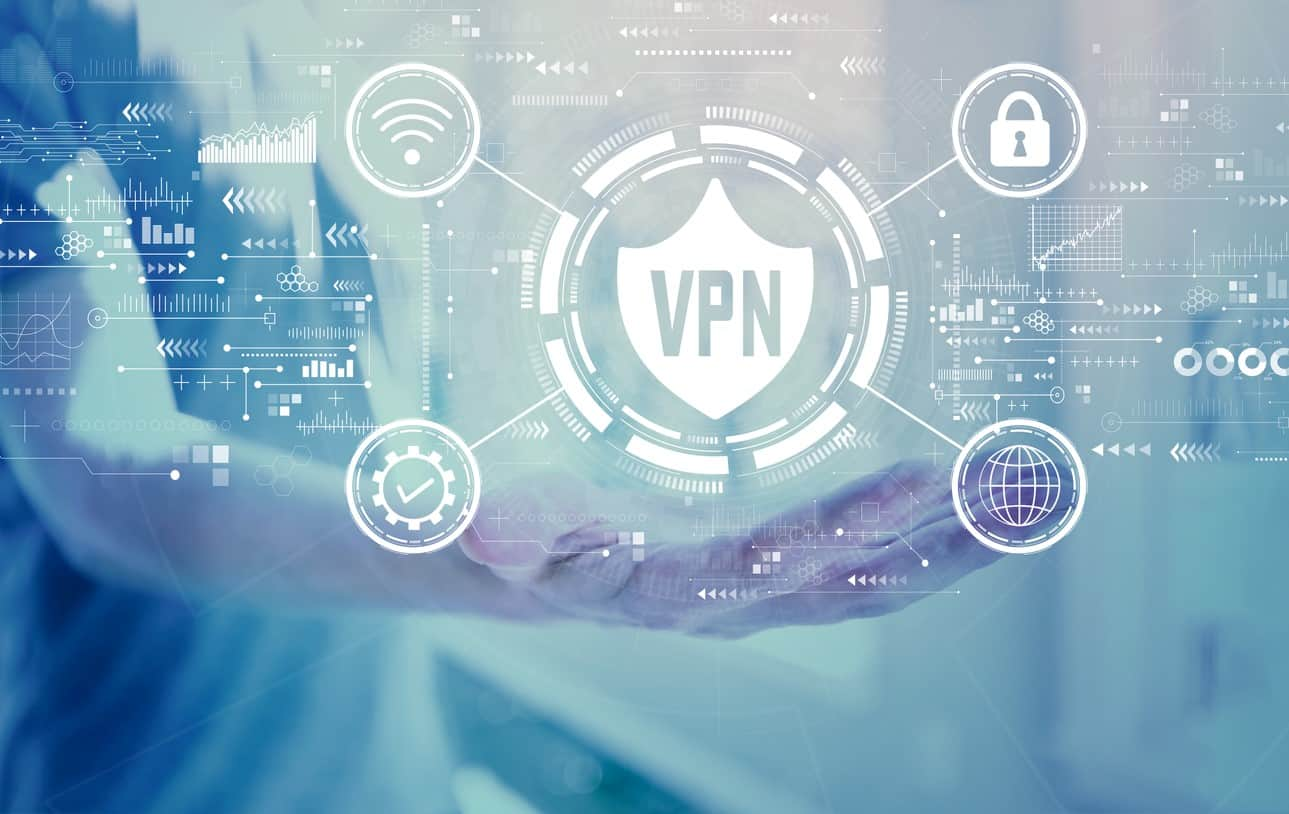Way back in the good old days, privacy was a given. People lived their lives in the comfort of their own homes and unless there was some major espionage plot against them, no one ever breached that protection. We sent letters which were signed and sealed and had conversations face to face where only people present could witness them. While there was always the risk of having your head chopped off by unruly matriarchs, at least you knew your private information was hidden from any pesky prying eyes.
Our heads might be safer now, but our personal information sadly isn’t. Even those of us who steer clear of sites like Facebook for fear of who Mark Zuckerburg will sell our data to next tend to leave large online footprints regardless. That’s because every search you put into Google and every website you visit leaves a little mark next to your online name. That’s a mark which companies and governments can easily use to their advantage.
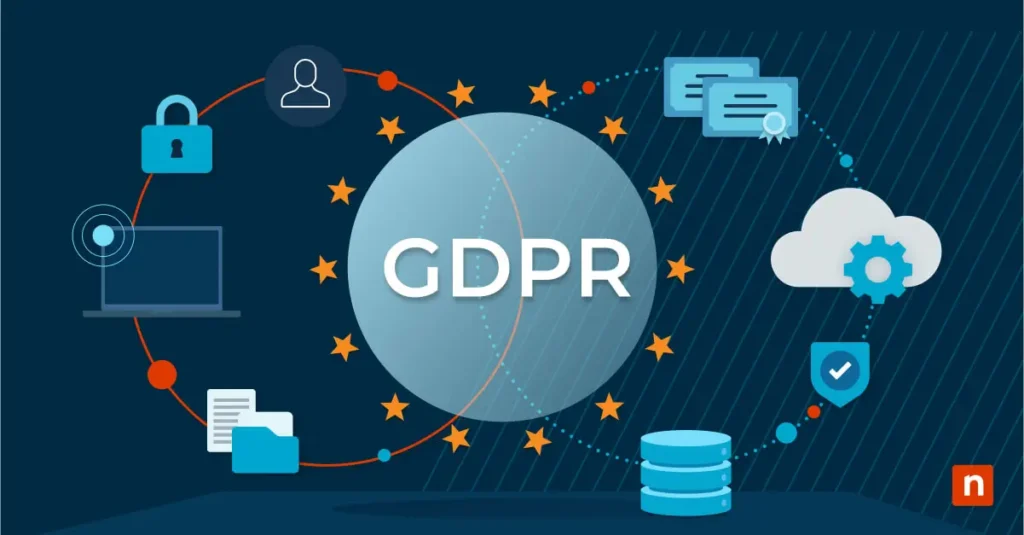
Of course, the good old GDPR compliance which was implemented few years back was supposedly designed to bring back a level of privacy fit for Anne Boleyn’s bedchamber. But, things haven’t quite worked out as planned. Instead of protecting anything, GDPR has simply made it so we have to click accept on privacy breaches before they happen. How very chivalrous of you, internet poachers.
Admittedly, when the internet began, this privacy invasion wasn’t even a thought for most of us. We were so happy finally being able to send snail mail online that we never even knew the implications which would come about as a result. For the most part, neither did the government or any companies operating at the time. Back then, the internet was like an innocent new horizon of possibility.
Thanks to Facebook breaches and other questionable implementations, things are different now. We’re no longer the innocent internet users we once were, and companies and governments have most definitely figured out how to track our every move online. In fact, having a computer in the room can sometimes feel like having a government spy in your home with you.
The good news is that, as much as companies have been working this system, people have been behind the scenes figuring out how to take back that control. It looks like they might’ve done it at last with a little something called a VPN. But what exactly is this VPN nonsense, and how can it save your privacy?
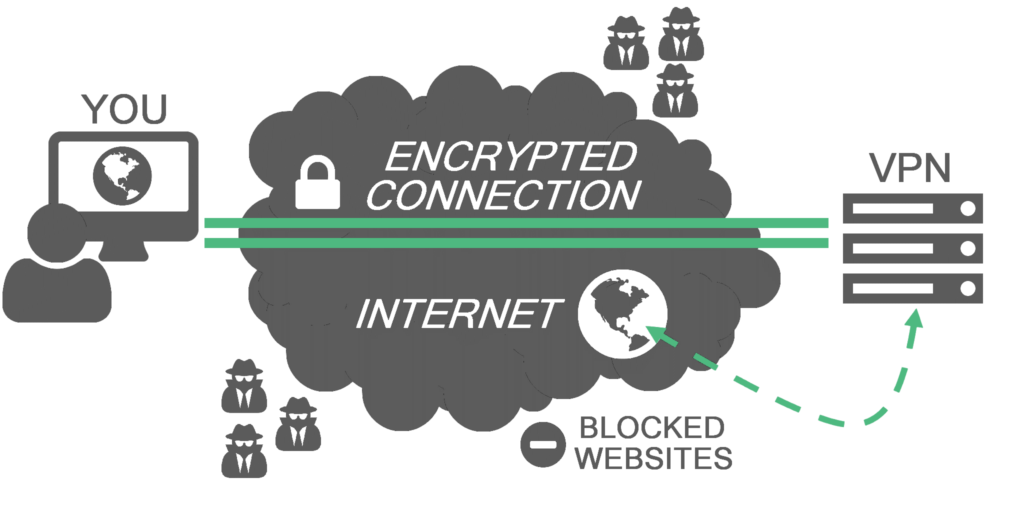
What is a VPN and how does it work?
Let’s start at the start, shall we? In simple terms, a VPN is a virtual private network. The clue is, of course, in the name. This is an online network with increased security and privacy. That’s what we in the internet world have been waiting for. We understand that for people who are new to the world of VPNs, even this description may seem like a strange piece of jargon, so let us break things down further.
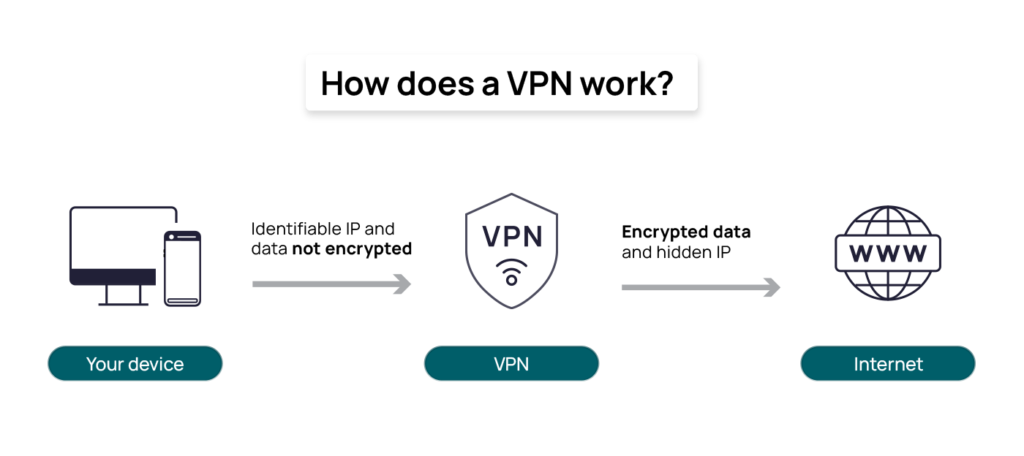
A VPN works by connecting your computer (or other chosen internet device) to another device (server) somewhere else on the internet. Your VPN will then allow you to browse using that other device’s connection. For the most part, your VPN will come from another country. That means you’ll be able to bypass internet censorship in the country you live in, all while making sure that governments and companies can’t track what you’re doing. This is like hidden location internet browsing where traditionally users relied on it for security when working in public spaces. Nowdays – avoidance of censorship and information theft is most definitely becoming the primary purpose.
If you want to get into the nitty gritty jargon of the VPN, there are some prime terms which you’ll need to know, and they are –
VPN Service – The entity which provides you with the ability to use their VPN. Usually in the form of a subscription.
VPN Server – The endpoint of the VPN to which you connect your device.
VPN Protocol – The method used to connect your device.
VPN Client – The software that connects your computer to the VPN.
Why do you need a VPN?
So, that’s the how-do and jargon part over and done with. You’re practically a VPN pro already. But, don’t go anywhere, because it’s time to learn why you would need a VPN in the first place. To be honest, the reasons for this have changed a great deal in recent years and they’ll keep changing as internet privacy does. Equally, your reasons for needing a VPN will depend on your individual internet use and needs. Still, you could probably benefit from using a VPN if you –
Often access the internet in public places
Want to get around censorship or online blocks in your country
Want to stream content in privacy
Are looking for added protection from hackers
Are worried about the ways companies are using your information
Want to protect multiple passwords and details
Are looking to hide your IP address
In short; anyone looking for extra protection online could benefit from a VPN subscription. Whether you’re afraid of hackers or government officials, a VPN could soon become your online shield armour.
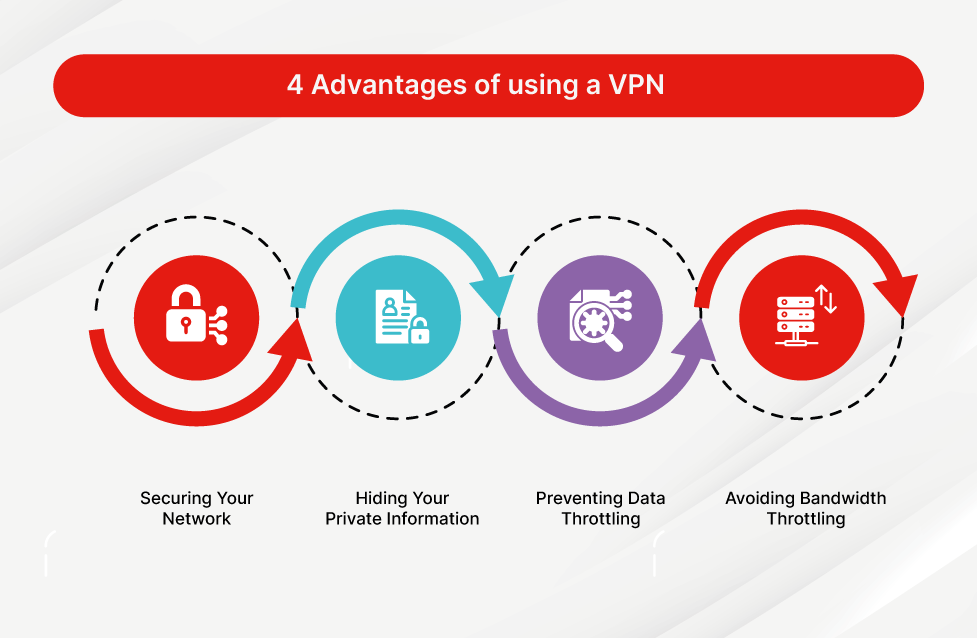
The main VPN benefits
As if we haven’t done a good enough job of selling VPNs so far, it’s time to consider the main benefits of using a virtual private network. Admittedly, we’ve touched on many of these above, but what’s the harm in going over those benefits again, and even adding a few more to the mix for good measure? The reality is that VPN users can enjoy a whole multitude of benefits. Hence why this way of browsing has been gaining such fast steam in the last few years. If you want to enjoy the following benefits, then, you shouldn’t hesitate to sign up for a VPN subscription straight away. Or at least, once you’ve finished reading this article…
The privacy thing
This article has barely got off the ground and we’ve already mentioned it many times, but in case you hadn’t realised – VPNs increase privacy! You didn’t see that coming, did you? Seriously though, VPNs increase your privacy in a whole load of different ways, and they could be a massive help for protection in the modern age. Whether you’re hiding from hackers or yet another company who want your email address, a VPN is the greatest camouflage.
As well as helping to hide your IP address through the use of a private network, a VPN can help to stop an ISP (information stocks online) from logging your activity. Effectively, you could think of this as living under the radar by dancing on the lights. You certainly wouldn’t ever need to worry about your personal information landing in the wrong hands again.
The remote access
We love a bit of remote access in the modern age. Being able to access an internet connection anywhere means that we can work where we want and get on our devices no matter where we are. Luckily, VPNs have this remote access thing in the bag. That’s because a VPN is not dependent on any network or wifi connection. In fact, once your VPN is up and running, you’ll be able to access it from absolutely any network. That means you can sign into hot spots wherever you are and get browsing at a moment’s notice. All without the risks that public networks like these can sometimes bring because remember, your VPN can take care of privacy!
Cutting costs
You can cut costs in a few different ways when you use a VPN. For one, shopping around for your VPN subscription in the first place could see you landing yourself with a deal which is a fraction of the cost you currently pay for your standard wifi connection. Just make sure that you read the small print and pay towards a lifetime VPN to get the best for your money.
That isn’t the only way that VPNs can help you to cut costs. One of the unexpected facts which will keep popping up when you research this is the potential to save money on flights. Yes, you did read that right. You might not think that a VPN would have any standing on your summer holidays, but you’d be wrong. Remember that a VPN allows you to effectively travel to another country every single time you get browsing. If flight prices are significantly cheaper in the country of your VPN then, you could get the benefits of those deals, all from the comfort of your home. Add that to the cheap upfront cost and your VPN could soon save you a fortune.
Is a VPN worth it?
If you’re asking yourself whether a VPN is worth it, the simple answer is yes. In case you didn’t realise from the points made above, a decent VPN can save you a great deal of money and we aren’t just talking about the flights either. Everyone from retailers to subscription services base their pricing on location. If you live in a country with high living costs, then, you’re automatically set to pay more. Unless, of course, you buy from a VPN which is based in countries with the best deals. Even better, VPNs themselves are astoundingly cheap to access. By using comparison sites and shopping the market, you could end up paying as little as €2.50 per month for your VPN use. Even with higher VPN price rates, it’s unlikely that you’ll need to spend more than €10 each month.
The only time that VPN isn’t so worthwhile is where free options are concerned. Many users fall into the trap of thinking that they must be a better deal if they’re cheap, and that’s certainly how it seems on the outside. The problem is that, as soon as you choose a free option, you pretty much undo the benefits of using a VPN in the first place. Free VPNs often have compromised security, aggressive advertising and can even lead to companies selling your data. Ironically, this is all the stuff you’re trying to avoid by using a VPN in the first place. And, come on; what’s the point in cutting costs when they’re so low in the first place?
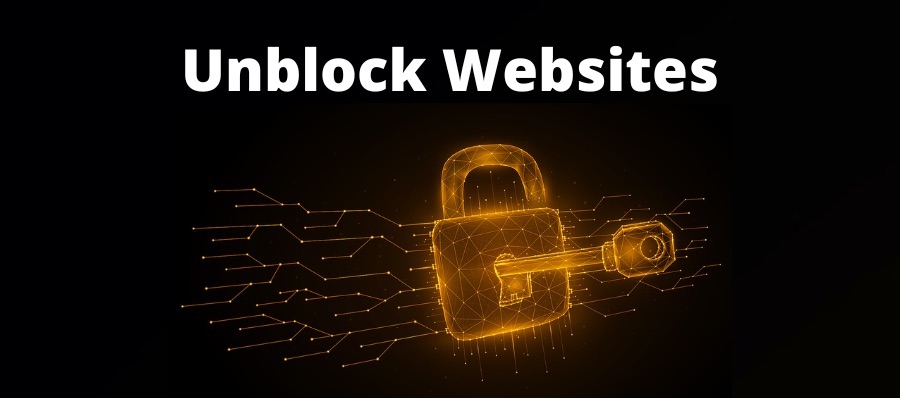
Does a VPN unblock websites?
Privacy aside, unblocking websites is one of the main arguments for VPN use, especially since policies like the block of some sites have come into play in almost every country. Many people simply don’t want to provide their personal information to gain access to sites they’ve always used. The good news is that, yes, VPNs can unblock websites, and they do it thanks to a nifty little loophole.
The fact is that most website blocks come about due to geo-locations and government restrictions. These are easy to work around when your IP address is hidden by a server located in Italy or America.
It’s also worth noting that, in the case of workplace or classroom browsing, a VPN could easily get around any pesky blocks put against personal websites and the like. That’s because your VPN effectively encrypts your footprint, meaning you can dance around those blocks without alerting anyone.
How much can the government see when you don’t use a VPN?
While we’re on the subject of whether a VPN is worth it or not, it’s worth considering exactly what the government can see if you don’t use a VPN. You might, after all, be tottering along happily with your standard connection, not even realising the breaches which are happening behind the scenes. Some people are even convinced that the whole ‘government are watching you’ thing is some far-fetched conspiracy.
Of course, there is a level with this. There isn’t some poor schmuck locked in a government office somewhere dedicated to the sole purpose of checking everything you do online. That would be impractical and a little crazy. That said, the government does have access to more of our online data than many of us realise and not always for just reasons. It’s no secret, after all, that certain words and search terms are flagged for investigation on government computers. It’s also not surprising to find that sites like Google and Facebook have been coerced into handing private information, including personal messages, to government agencies in the past.
Of course, many of us assume that these precautions won’t impact us, and we would be right. But, what very much does affect us is a little something called metadata. Collected through those ISPs that we mentioned earlier, metadata is effectively a collation of everything you do online. There might not be a government official checking your every move, then, but that doesn’t mean the information isn’t still stored somewhere. While ISPs don’t give detailed information, they reveal enough by storing every website you visit for upwards of twelve months. That’s a pretty large footprint and one the government can step into any time they fancy. That leads us nicely onto whether the government can track you when you are using a VPN. The short answer to this is no. By its very nature, a VPN protects you from privacy breaches like this, by both masking your IP address and ensuring that ISPs are unable to collate your data. In a way, everything you do on a VPN is in a kind of encrypted online tunnel. That’s a tunnel which the government can’t dig into.
How do you know if your VPN is safe?
As we’ve mentioned, VPNs increase online safety. But, as with anything, not all VPNs are created equal. Remember that free VPNs often leave you at risk of entirely new breaches, and they aren’t the only ones. There are VPNs out there with small print which doesn’t exactly have such high levels of protection behind it. The good news is that there are sure ways to judge whether a VPN is safe or not. We’re going to help you pick up on a few sure signs of a safe VPN.
A leak prevention policy
Much of the increased security you stand to see from a VPN comes from a hidden IP address. That said, there are some small risks of VPN IP leaks which could still see you exposed. As such, you should always look for a VPN with a specific leak prevention policy to ensure that this doesn’t happen.
Multi factor authentication
Even on a VPN, signing in with one basic password leaves you at risk of hackers. While a private network can save you to some extent, it won’t do you much good if hackers can gain access to the network itself as well. As such, you should always seek a VPN with multi factor authentication, including at least a password and an email code or something similar. That way, you can rest easy that no one can access your VPN but you.
Definitely no logs
Using a VPN might save your online logs from government agencies and companies, but it doesn’t necessarily mean that no logs are being made. This can leave you at risk if hackers gain access to a VPN network and could even lead to security breaches you’re unaware of. To make sure it doesn’t happen, look for a VPN which doesn’t store any logs at all. That way, even your VPN provider won’t be able to gain access to your information if they try. It’s the ultimate in anonymity, and it’s a benefit you should look for from any network.
Do you need a VPN at home?
So far, we’ve spoken a lot about the benefits of VPN use when you’re on public wifi networks. Undeniably, this was the primary initial use for VPNs, with people who spent time browsing in coffee shops aware that they were leaving themselves open to breaches. But, all this begs the question of whether you should also seek a VPN for home use. After all, your private wifi network isn’t exactly exposed the way that a public option is. You might assume then that a VPN is only necessary if you spend time online while you’re out and about. But you would be wrong.
Of course, a lot of those public threats do become obsolete where our home networks are concerned, but that doesn’t mean there’s absolutely no risk. In fact, there have been previous cases of even home wifi providers selling their customer’s information. Not to mention that you’re at risk from companies and governments no matter where your browsing occurs.
It’s also important to remember that not all VPN use is about protection. VPNs can also provide you with access to streaming and websites which you would otherwise not be able to use. This is even more the case since GDPR compliance came in, with many websites which don’t have GDPR now entirely inaccessible from EU connections. Whether you want to access an out of bounds website or simply stream something from American Netflix, then, a VPN in your home is very much worth your while.
Sadly, using a VPN at home doesn’t mean you can ditch the wifi, as you need a point of connection to be able to use a virtual private network in the first place. But, if you think that paying a little extra on top for a VPN at home would be worth your while, then don’t hesitate to sign up. Remember, too, that you’ll then be able to take this VPN out with you anyway, making it a multi-purpose investment which you won’t regret.

How do you set up a VPN on your Mac at home?
Next, you might be wondering how exactly you can set up a VPN on your Mac at home. If you’ve never done it before, after all, this can seem like an entirely new language. The good news is that, in the initial stages, shopping for a VPN isn’t much different from shopping for a Wifi deal. You should head to comparison sites and get a good idea of the prices around before you commit to anything. It might also be worth considering which country you’d be best off basing your VPN within for the purposes you have in mind.
Once you’ve settled on a VPN which suits, it’s time to get connected. Unlike wifi, though, connecting to a VPN doesn’t involve flashing lights and black boxes which you wait in for all day long. In actual fact, it’s a fair bit simpler than that. According to Apple’s very own VPN instructions, getting connected is a simple as signing up for your VPN and then –
Choose your Apple menu
Head into system preferences
Click on network
Select your VPN network from the list
Click on the configuration pop up menu
Choose configuration
Click connect
It really couldn’t be simpler. All you need to do is make sure that you have your VPN type, server address, username, and password to hand before you get going. Then, you could be connected at home in no time at all.
Do you need a VPN for your iPhone?
We’ve touched briefly on the benefits of using a VPN from any device or location. If you’re set up for VPN browsing at home, though, you might be wondering whether it’s worth getting set up on your iPhone, too. But, given that you’re going to end up on all manner of public networks if you don’t, we would argue that you definitely do need a VPN for your phone, as well. This is especially useful if you intend to work from your phone when you aren’t in the office, as it’ll allow you to access files remotely without any risk of a leak.
Believe it or not, mobile VPNs also allow you to access multiple connections at once. This is beneficial for those who use a lot of bandwidth on things like conference calls, as it increases bandwidth and allows you to stream at a higher quality.
And then, of course, there’s the multitude of benefits we’ve touched on for every other VPN going. You could say then that a mobile VPN is a no-brainer. Even better, this is as easy to set up as a VPN on your Mac. All you’ll need to do is head into the general section of your settings, then tap VPN and add you VPN configuration. Simple.
Are there any VPN disadvantages?
We’ve painted such a pretty VPN picture so far that you may well be wondering if any disadvantages are hiding in the wings. After all, shouldn’t more people be using VPNs if they really are this good? Well, we too think it’s a travesty that more people aren’t using this form of internet browsing because, honestly, it is as good as it sounds. That said, we’re all about giving you a fair idea, which is why we’re going to take a realistic look at the few disadvantages that you might pick up on during your VPN journey.
Is this connection slightly slow?
Because of the increased distance between you and the VPN server, there is a small risk that your connection will be a few milliseconds slower than if you had a fibre optic wireless box right beside you. Honestly, though, can you complain too much about an ever-so-slight delay when you’re effectively travelling to another country every time you browse? Besides, the delay is so small in the majority of cases that you’ll barely notice it in your standard browsing.
Hang on, that’s not a very good VPN
As we mentioned, some VPNs can let the side down with their lack of security features. This is a problem because it leaves you exposed without your even realising it’s happened. But, come on; you can’t blame a VPN for this when you get down to it. You’re the one who made this selection, after all. The best thing to do for avoiding exposure and information storage is just to shop around and forever keep in mind those added safety precautions we mentioned earlier. You might also want to look out for VPNs with a kill switch feature which ensures that, even if your connection drops, your IP address can stay in those shadows.
The true price of free VPNs
In all honesty, most of the downsides users find from VPNs come from free offerings. Surprising that, isn’t it? While you do enjoy the one benefit of free connections this way, most suppliers would argue that you might as well not use a VPN at all if you’re opting for a free choice. And, honestly, they wouldn’t be far wrong. For one thing, you should know by now that nothing is entirely free. VPN servers have to make their money somehow. If they aren’t doing that through your purchase, there’s more risk of them opting to sell your private data for profit. Then, of course, there’s the fact that any decent VPN system is going to charge. If a VPN is free, then, it probably isn’t the best quality option on the market. This can mean that those security measures we’ve touched on will be nowhere in sight. That can leave you as much exposed as if you didn’t bother with a VPN at all.
A final word
So, there you have it; simple answers to near enough every question you could have on the subject of VPNs. But what have we learnt through all this? That no longer having our heads chopped off is most definitely a good thing. Oh, that and the fact that a VPN can enhance and change your entire online journey. At least, it can if you’re willing to pay the relatively small prices it takes to get a VPN you can trust. As simple as that, you’ll be able to browse without interference and even stream from any country of your choosing. So, what are you waiting for? Go ahead and verify your VPN today.
